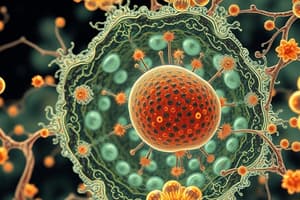Podcast
Questions and Answers
What is the primary role of the nucleus in a cell?
What is the primary role of the nucleus in a cell?
Which organelle is responsible for breaking down food molecules and producing ATP, the cell's primary energy source?
Which organelle is responsible for breaking down food molecules and producing ATP, the cell's primary energy source?
How does the organization of DNA within chromatin affect cellular function?
How does the organization of DNA within chromatin affect cellular function?
What is the primary function of the endoplasmic reticulum (ER) in a cell?
What is the primary function of the endoplasmic reticulum (ER) in a cell?
Signup and view all the answers
How do mitochondria contribute to cellular energy production?
How do mitochondria contribute to cellular energy production?
Signup and view all the answers
What is the role of chromatin in the nucleus?
What is the role of chromatin in the nucleus?
Signup and view all the answers
What is the main function of lysosomes in a cell?
What is the main function of lysosomes in a cell?
Signup and view all the answers
Which stage of the cell cycle involves cell division?
Which stage of the cell cycle involves cell division?
Signup and view all the answers
How do cells communicate with each other?
How do cells communicate with each other?
Signup and view all the answers
What is the purpose of apoptosis in cellular processes?
What is the purpose of apoptosis in cellular processes?
Signup and view all the answers
Why is understanding cytology important?
Why is understanding cytology important?
Signup and view all the answers
'Autophagy' is a process that primarily involves:
'Autophagy' is a process that primarily involves:
Signup and view all the answers
Study Notes
Cytology and Cell Function
Cytology is the branch of biology concerned with the study of cells from living organisms. It plays a critical role in understanding various aspects of cellular functions and pathologies. This section will explore key aspects of cytology related to cell function.
Nucleus and DNA
The nucleus, which contains most of the cell's genetic material, is often considered the control center of the cell. Within the nucleus lies chromatin, which consists of DNA wrapped around histone proteins. While DNA itself does not have much structure, its organization within chromatin influences how accessible it is for transcription into RNA, and thus for protein synthesis and cellular function.
Mitochondria and Cellular Energy Production
Mitochondria are essential organelles that provide energy to the cell through a process called cellular respiration. They use oxygen from the environment to break down food molecules into smaller units of energy, which cells can then convert into ATP (adenosine triphosphate), the primary source of energy for most cell functions.
Endoplasmic Reticulum and Protein Synthesis
The endoplasmic reticulum (ER) is an extensive network of tubules within the cytoplasm. ER plays several roles in cells, including protein synthesis, lipid metabolism, calcium storage, folding of secretory proteins, and other functions. These activities are crucial for maintaining cellular function as they ensure proper protein production and folding, which are essential for cellular processes such as cell signaling, cell adhesion, and cell movement.
Cell Cycle and Cell Division
The cell cycle is a series of events that occur within a cell leading to its division and the creation of two identical daughter cells. The cell cycle is divided into four main stages: interphase (G1, S, and G2), and mitosis (M) phase. During interphase, the cell grows and synthesizes new DNA. Mitosis, or cell division, occurs during the M phase, where the cell divides into two identical daughter cells. This process is essential for growth, development, and tissue repair in multicellular organisms.
Cellular Waste Disposal
Cells generate waste products as a result of their metabolic processes. These waste products can be harmful if they accumulate in the cell. The lysosomes, a specialized type of organelle, are responsible for breaking down and recycling waste materials within the cell. This process, known as autophagy, helps maintain cellular health by removing damaged organelles, proteins, and other waste products.
Cellular Communication
Cells communicate with each other through various signaling pathways. These pathways involve the release of chemical messengers, known as hormones and neurotransmitters, which bind to specific receptors on the target cells, triggering a cascade of intracellular events that ultimately influence cellular function. This communication is essential for maintaining the coordination and integration of cellular activities within an organism.
Cell Death
Cells can undergo programmed cell death, or apoptosis, when they are no longer needed or are damaged beyond repair. Apoptosis is a controlled process that involves the activation of proteases that break down cellular components, ultimately leading to the elimination of the cell. This process is crucial for maintaining tissue homeostasis and preventing the spread of cellular damage.
Understanding cytology and its various aspects is essential for understanding the complex functions of cells and their importance in maintaining the health and function of organisms. The study of cytology has led to numerous advancements in medicine, biology, and other fields, further enhancing our understanding of the world around us.
Studying That Suits You
Use AI to generate personalized quizzes and flashcards to suit your learning preferences.
Description
Explore key aspects of cytology related to cell function, including the nucleus and DNA, mitochondria and cellular energy production, endoplasmic reticulum and protein synthesis, cell cycle and cell division, cellular waste disposal, cellular communication, and cell death. Understanding these topics is crucial for comprehending cell functions and their significance in maintaining organism health.




